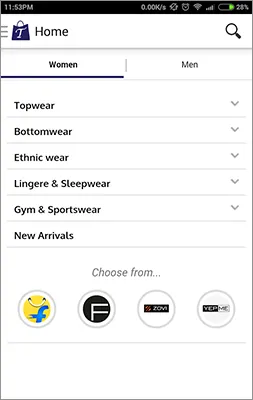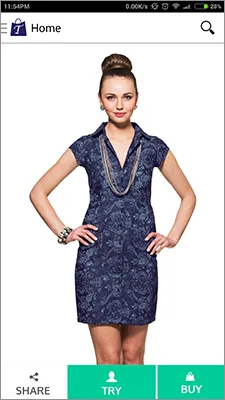[App Fridays] With ‘virtual dressing rooms’ TrialKart wants to save time and revenues for e-commerce players
While e-commerce has made shopping online easier in most product categories, a large section of fashionistas still prefer to shop at brick and mortar stores, and insist on trying on outfits before purchasing them.

While e-commerce players cannot provide the wholesome experience that physical stores can, they come close to doing so. With flexible return policies, discounts and maybe even ‘virtual dressing rooms’ in the near future. TrialKart, a Bengaluru based startup, wants to help users visualize how different clothes would look on themselves through their smartphones.
What is it?
Trialkart is a mobile-first and currently mobile-only platform that provides a virtual dressing room experience for men and women across different product categories. Through the app, users can choose any listed apparel, and click on the ‘Try’ option, and visualize how the apparel would look on themselves or a friend.
The image for trial can either be taken by the phone’s camera on the spot, or from the gallery. Users can pinch, zoom, readjust and orient the apparel to place it correctly on their picture, and see whether it suits them or not. Users can also share the new outfit with their friends or family through social media to get their opinions.
Idea to execution

The startup was founded in February 2015 by Harsha, Jayalakshmi Manohar, and Vipul Divyanshu. Jayalakshmi looks after the UX and UI of the app, Vipul oversees the back-end technology and Harsha handles strategies and business. They currently have one full-time employee.

They currently aggregate clothing from Flipkart, Fashionara, Zovi and Yepme on their app. Trialkart does not require users to sign up or log in to use the app, but existing customers of e-commerce platforms can use the same login credentials of respective sites at the time of purchase to buy their desired products. The app is currently available for only Android users, and they plan to launch an iOS app in the future.Trialkart has a patent pending technology for the app’s architecture and algorithms. They are currently looking to raise funds, and their long term vision is to bridge the gap between the online and offline shopping experience. They are looking at B2B avenues to generate revenues and also affiliate marketing.
Harsha added “28-40% of all apparel sold online is returned by dissatisfied customers due to trial and fitting issues. Although online shopping is a convenience, it can be a nightmare when it comes to apparel, especially for women. When they shop for a dress, t-shirt, shirt etc, they want to try it on themselves before they buy it. They miss the trial room experience, and often end up returning what they've bought after a frustrating experience online.”
Competition
Virtual dressing rooms are an interesting concept and there are a few startups that are trying to solve this pain point globally as well. Some of the notable ones are MixMe, which lets users mix and match clothes, organise their wardrobes and also make purchases. Fitle needs users to click three pictures of themselves from different angles. It then generates a 3D model of the person, to let them try out clothes virtually. Smart Dresser by DNA Design is another player in this space.
Personalisation of clothes is already a trend in India. Voonik.com recommends clothes to people based on their preferred style, taste and body type. They had recently raised $5mn from Sequoia Capital. Myntra too provides personalization and users can request for a call with their personal stylists for a consultation.
What we liked
The app makes for an interesting user experience and is well-executed. The visual experience of trying on different tops - clothes for the torso - such as shirts, t-shirts, suits, jackets and blazers is quite good. The ability to pinch, zoom, re-adjust or orient clothes is useful. I was able to place clothes, even in badly shot pictures, and was still able to visualize how it would look on different people. The ability to use the camera or pick a photograph from the gallery adds to the experience.
What could be improved?
While the experience was good overall for upper body clothes, when it came to the lower body, I found a few bugs. If the model has their hands in their pockets, then the app’s algorithm completely omits that section, and one can see a rectangular hole in the pocket section of a pair of jeans. The team could look at an autofill feature, or working around such bugs. Harsha acknowledged the issue, and said that it would be solved within a month’s time. He added, “Our algorithm for lower body clothes is at 80% accuracy, and is learning and improving. You will see an improvement soon.”
The ‘virtual frames’ generated for different pants and jeans are rigid. They are based on how the model poses for the picture. In some cases, the models stand straight, sometimes resting heavily on one leg with the other one bent etc. So to visualize correctly for these garments, users currently need to take pictures in the exact same orientations as the models.
YS verdict
On the whole, TrialKart does provide an engaging visual experience that serves its purpose. The app also takes up only 1.2MB of space, which adds to the appeal. The team is also currently working on an AR plugin to provide a better virtual experience. It will be interesting to see how TrialKart improves upon their app and finds the product-market fit.
Website: Trialkart
What do you think about this app, do let us know in the comments below. Also do check out other apps under our App Fridays and Pursuit of APPiness series.
If you have an interesting app that you feel could be featured on App Fridays please apply here.



![[App Fridays] With ‘virtual dressing rooms’ TrialKart wants to save time and revenues for e-commerce players](https://images.yourstory.com/cs/wordpress/2015/07/yourstory-app-friday-trialkart-insidearticle3.jpg?mode=crop&crop=faces&ar=2%3A1&format=auto&w=1920&q=75)




